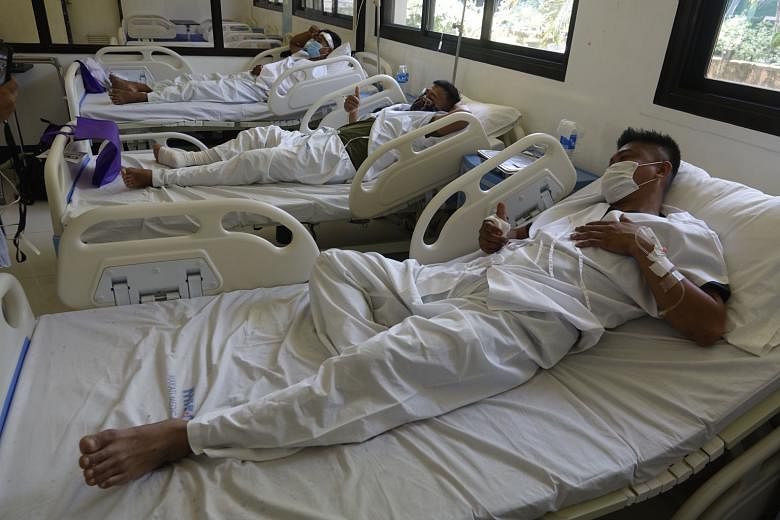The twin blasts in Jolo town in the far-flung southern part of the Philippines that killed at least 15 people on Monday could have been the work of the widows of two prominent militants of the Islamic State in Iraq and Syria (ISIS), a top Philippine security official said yesterday.
Two suicide bombers were behind the attacks, Lieutenant-General Cirilito Sobejana, who is the Philippine Army chief, said in radio interviews.
He said the two were most likely the wives of the first confirmed Filipino suicide bomber and a senior liaison between ISIS and the extremist group Abu Sayyaf.
Two powerful explosions ripped through Jolo, which is a known Abu Sayyaf stronghold in Sulu province, at around midday on Monday, killing at least seven soldiers and a policeman.
Seven civilians also died. Investigators believe two of them were the suicide bombers.
Security officials earlier said a woman set off the second blast, as a soldier was approaching her.
Lt-Gen Sobejana said forensic evidence and video footage showed the first attack was also carried out by a suicide bomber who targeted soldiers buying supplies at a grocery. But it could not yet be ascertained whether the first attacker was also a woman.
Lt-Gen Sobejana said one of the bombers could be the widow of Norman Lasuca, who on June 28 set off one of two bombs that exploded inside a temporary camp of a special army counter-terrorism unit in Indanan town, in Sulu.
Lasuca was the first Filipino confirmed to have mounted a suicide attack in the Philippines.
The other bomber was probably the widow of Talha Jumsah, also known as Abu Talha, said Lt-Gen Sobejana.
Abu Talha was a "high-value" target trained in bomb-making and had instructed Abu Sayyaf militants in setting up suicide attacks.
He also served as "finance conduit and liaison" between ISIS and the Abu Sayyaf. He was killed in a clash with security forces in November last year in Patikul town, Sulu.
"We had been monitoring these two female suicide bombers," Lt-Gen Sobejana said.
He said the trail went cold after four army intelligence officers who were tracking the two were gunned down in still murky circumstances by policemen enforcing quarantine restrictions in Jolo.
Lt-Gen Sobejana said the two suspected suicide bombers were believed to have been offered refuge by the Abu Sayyaf faction of Hatib Sawadjaan, named in security documents as ISIS' new "emir" in the Philippines.
Sawadjaan's group was behind the twin suicide bombings that targeted a Catholic cathedral in Jolo in January last year. At least 23 were killed and more than 100 injured.
Sawadjaan was said to have been seriously wounded in a clash early last month and that his nephew, Mundi, was now calling the shots.
Lt-Gen Sobejana said Sawadjaan, who is already in his 60s, was probably already dead. "I think the two women were motivated by Mundi Sawadjaan, using the deaths of their husbands," he said.

